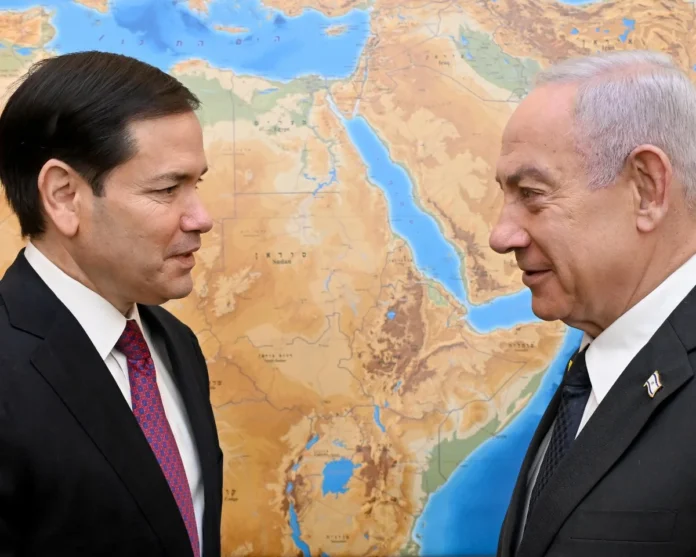Israeli Prime Minister Benjamin Netanyahu has hinted that further strikes targeting Hamas leadership remain on the table, following a controversial operation in Qatar last week that sparked widespread international criticism.
Netanyahu Defends Israel’s Right to Act Beyond Borders
Speaking alongside US Secretary of State Marco Rubio at a press conference in Jerusalem, Netanyahu said that Israel would continue to act against threats “wherever they are” and that Hamas leaders would not enjoy immunity even outside Gaza.
“Every nation has the right to defend itself beyond its borders,” Netanyahu said, justifying Israel’s decision to launch a strike in Doha, Qatar – a move that angered many of Israel’s allies, including Washington.
The attack reportedly killed six individuals but missed senior Hamas officials. Qatar, a close US ally that hosts a major American airbase, condemned the strike, while US President Donald Trump reassured Qatari leadership that such actions would not be repeated on their soil.
Rubio Stresses US-Israel Ties Despite Tensions

When asked whether Washington had played any role in the strike, Netanyahu firmly responded, “We did it on our own. Period.”
Rubio emphasized that the United States remains committed to its Gulf partners, saying, “Our relationships with Gulf allies are strong.” Both leaders attempted to present a united front, with Rubio praising Israel as a critical strategic partner and highlighting joint technological and cultural achievements.
Regional Diplomacy and Arab Summit Support for Qatar
The meeting comes at a time when Arab leaders are gathering for a summit to show solidarity with Qatar. The Qatari prime minister has urged the international community to condemn Israeli actions and to hold the country accountable for what he described as violations of international norms.
Qatar has played a central role in mediating indirect ceasefire talks between Israel and Hamas since 2012 and hosts the group’s political bureau. Following his Israel visit, Rubio is expected to travel to Qatar for further diplomatic discussions.
Visit to Western Wall Underscores Symbolic Alliance

During their time in Jerusalem, Netanyahu and Rubio visited the Western Wall, accompanied by US Ambassador Mike Huckabee. Rubio performed the traditional ritual of placing a written note into the wall. Reporters’ questions about Israel’s operations in Qatar were left unanswered.
Intensifying Military Operations in Gaza
Meanwhile, Israel’s military operations in Gaza are escalating. Over the weekend, the Israel Defense Forces (IDF) demolished multiple residential buildings in Gaza City and issued warnings for residents to evacuate to the southern part of the enclave.
Local media report that Israeli ground forces are preparing to advance into western Gaza City. The IDF estimates roughly 250,000 Palestinians have already fled south, though hundreds of thousands remain trapped, citing lack of money, shelter, and safe passage.
“They are asking us to leave our homes, as if this were a vacation trip,” said Gaza City resident Hafez Habous. “We simply have no money, no tents, no transportation. Even if you find a driver, he demands 300 shekels – I cannot even afford tomorrow’s meal.”
Humanitarian Concerns Grow
The UN has warned that expanding the offensive could create an even deeper humanitarian crisis, particularly as famine has already been declared in parts of Gaza. Thousands of families were seen fleeing south over the weekend, many carrying what belongings they could on foot or in overloaded vehicles.
Settlement Expansion and West Bank Debate
Netanyahu’s government continues to push ahead with settlement projects in the occupied West Bank. Last week, Israel approved the long-debated E1 settlement plan east of Jerusalem, which would effectively divide the northern and southern West Bank.
“We are going to fulfil our promise that there will be no Palestinian state,” Netanyahu said as he signed the agreement. Finance Minister Bezalel Smotrich has also proposed annexing around 80% of the West Bank, a move widely condemned by the international community.
Currently, about 700,000 Israeli settlers live in roughly 160 settlements across the West Bank and East Jerusalem — territories that Palestinians hope will form part of a future independent state.
Rubio to Visit Controversial Archaeological Site
Rubio’s visit will conclude with a tour of the City of David archaeological park in occupied East Jerusalem. He is expected to attend the inauguration of the “Pilgrimage Road,” a tunnel running beneath Palestinian homes. Critics argue the project politicizes archaeology and undermines the rights of Palestinian residents in Silwan.
As tensions rise in Gaza and international calls for Palestinian statehood grow louder ahead of next week’s UN General Assembly session, Netanyahu’s remarks underscore Israel’s determination to continue its security operations, regardless of global criticism.
Sources: BBC

